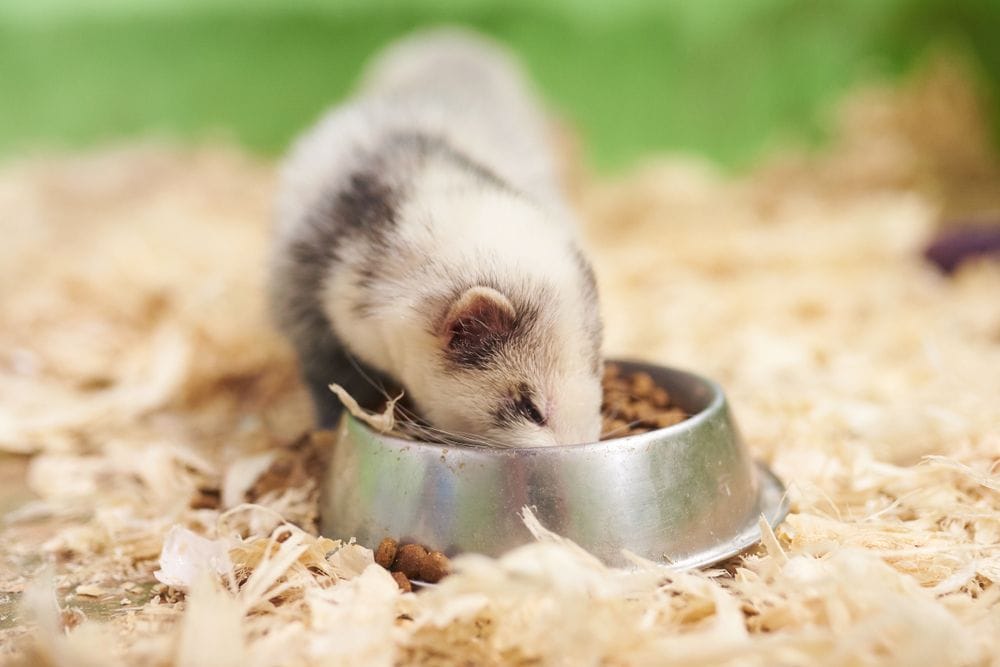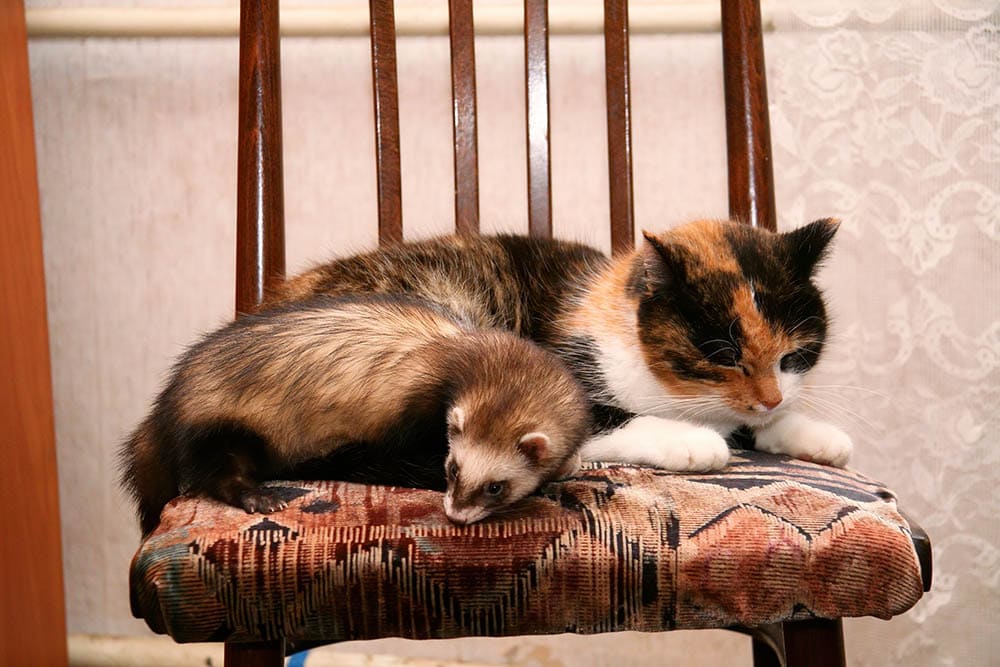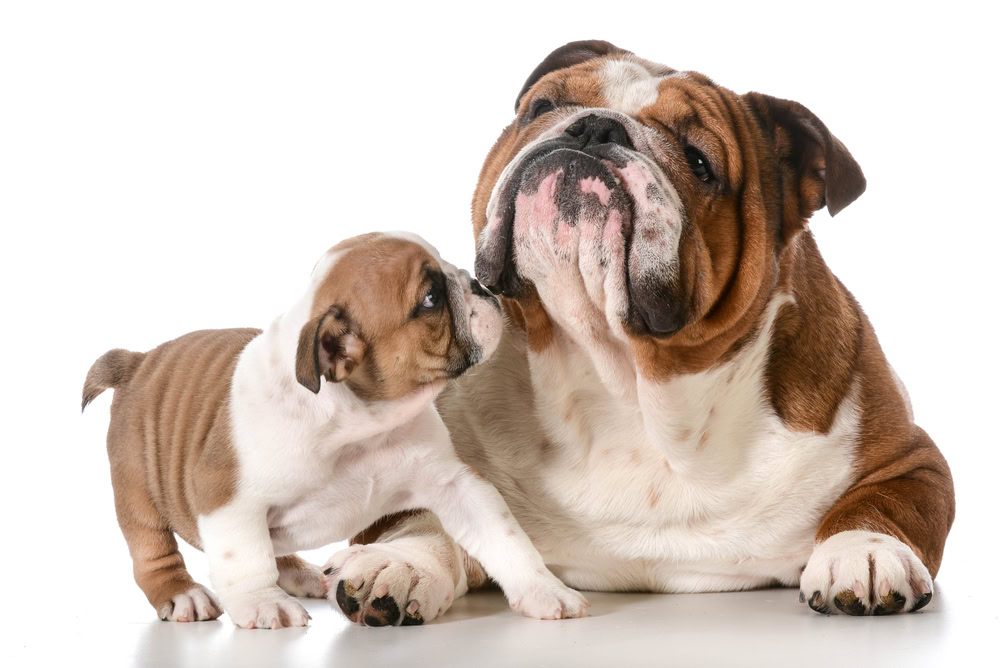If you have a multi-pet household, it might be much nicer if they all ate the same thing. However, every species seems to have their own commercial diet available to keep them healthy. Some animals can share one another’s food. But if you have a cat and a ferret, does this rule apply?
Cats and ferrets are obligate carnivores, meaning they need only a meat diet to survive. Because of domestication, other ingredients have been added and tolerated. Since they are so similar in dietary makeup, a cat can technically eat ferret food, but not interchangeably and frequently, so it should only be an “in case of emergency” practice.
The information presented in this article has been reviewed by a veterinary professional. However, this information isn’t intended to provide a specific recommendation for these products. We recommend consulting with your vet before opting to use any of these specific products for your pet.

Cats and Ferrets Have Different Dietary Requirements
If you’re wondering if you can interchangeably switch ferret and cat food, the answer is no. On an occasional basis, their diets are similar enough that it won’t hurt them if they get a hold of the other animal’s food, but it will not serve each one long-term.
If your ferret or cat ran out of their normal kibble, you can always give them a little of the other just to sustain until you can get more. However, if you think you can buy a giant bag of ferret food and distribute it to your cat (or vice versa), this is definitely not advisable. Over time, your cat will start to lack essential nutrients that help their body function. It can cause nutritional deficiencies and a decline in overall health if they are only fed ferret food.

Standard Recipe Differences Between Ferrets and Cats
For comparison sake, we will compare a standard bag of cat food and ferret food to see how different the nutritional content is and how it could be disruptive to one or the other. The most nutritionally friendly diet for both ferrets and cats would be an utterly carnivorous meal full of animal content.
However, it is impractical and expensive to fulfill this request, and carries risks of foodborne parasites, which is why so many people choose commercial diets instead. These diets are designed to match all of the species’ nutritional needs so they aren’t getting too many or too few of vital dietary components.
For this example, we’re going to use a standard ferret commercial food to get you familiar with all of the ingredients that are in most recipes. Then we will show you what most cat food bags look like.
Even though both of these critters are obligate carnivores, you will see that cat food does have grains, fruits, vegetables, and other additives that are outside of that natural diet. Even though a cat’s system has developed to tolerate these ingredients over time, our ferrets haven’t done the same.
Oxbow Essentials Ferret Food

Here is one standard ferret food as an example. Oxbow creates recipes for this particular species with a sterling reputation for optimal nutrition. Here are the details about this recipe.
Guaranteed Analysis
| Crude Protein: | 42.0% |
| Crude Fat: | 20.0% |
| Crude Fiber: | 3.0% |
| Moisture: | 10.0% |
Ingredients
Chicken meal, chicken, chicken fat, egg product, gelatin, rice flour, flaxseed meal, cassava root flour, dried plain beet pulp, lysine, natural chicken liver flavor, fish oil, potassium chloride, taurine, salt, citric acid, and white vinegar
As you can see, there are quite a few animal ingredients with some grain, vitamins, and minerals, but no vegetables or fruits. This is in alignment with their natural diet.
Purina Naturals Cat Chow

In this example for cats, we are going to look at Purina Naturals Cat Chow, as it is a standard recipe for cats. Purina is a trusted company with many years in the pet food industry. Let’s look at what they add in the formula.
Guaranteed Analysis
| Crude Protein: | 34.0% |
| Crude Fat: | 13.0% |
| Crude Fiber: | 3.0% |
| Moisture: | 12.0% |
| Linoleic Acid: | 1.25% |
| Arachidonic Acid: | 0.03% |
Ingredients
Chicken, corn gluten meal, chicken byproduct meal, rice, soybean meal, ground yellow corn, ground whole wheat, beef tallow preserved with mixed tocopherols, salmon, natural liver flavor, calcium carbonate, phosphoric acid, salt, and natural flavor.
This recipe contains many more grains but has chicken as the primary ingredient. So, while very similar in composition, there are some notable differences.
The Ingredient Breakdown
As you can see, the ingredients closely mimic one another with some minor differences. Cat food contains less protein than ferret food. You’ll also likely never find a ferret food with vegetables or fruits listed, but cat foods do. Also, you will find corn, wheat, and other grains in many cat food recipes, whereas most ferret foods contain gluten-free grain ingredients.

If you prepare fresh meat for your cat or ferret, this is something that can be offered interchangeably. If you cook up some lean chicken or organ meats for one of them, you can certainly extend the offer to both. This is really one of the only ways a cat and ferret can share the same food items.
Otherwise, each commercial diet is explicitly designed to match the nutritional needs of each species, which differ. So, while it might not hurt either one of them to have a bite of the other’s food in an emergency, the constant consumption of the wrong type of food can cause health issues and nutrient deficiencies over time.

Conclusion
So, now you understand that cats and ferrets have very similar dietary requirements. However, ferret food has a much higher protein content than many commercial cat foods. Because of this, it might not hurt them to interchange tidbits of food, but it should never be a common practice.
Neither cat food nor ferret food has the nutritional quality the other requires. So, neither formula will hurt them, but it’s best to stick with their species-specific commercial diets. Remember that you can also offer them similar snacks, like plain meats.
Featured Image Credit: AJSTUDIO PHOTOGRAPHY, Shutterstock



